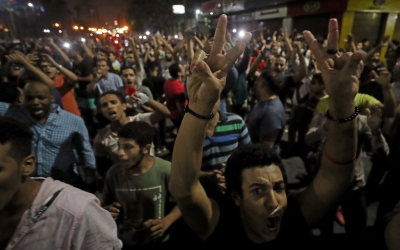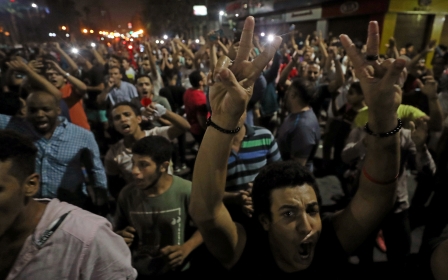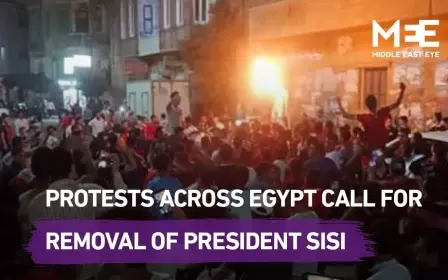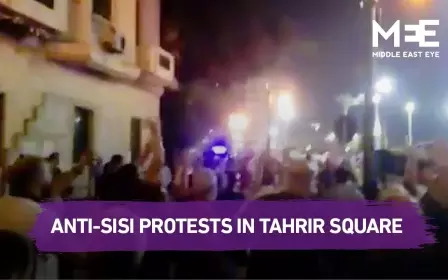Anti-Sisi protesters clash with Egyptian security forces for second night in Suez

Egyptian security forces clashed with hundreds of anti-government protesters in the seaport city of Suez on Saturday, firing tear gas and live rounds, said several residents who participated in the demonstrations.
In a show of dissent, hundreds of Egyptians in Suez took to the streets for the second night in a row, heeding an online call for protests against President Abdel Fattah el-Sisi. They were met with security forces barricading streets and deploying armoured vehicles in downtown Suez centring on Al-Arbaeen Street.
A heavy security presence was also maintained in Cairo's Tahrir Square, the epicentre of Egypt's 2011 revolution, after protests in several cities called for Sisi's removal. Such demonstrations have been rare since Egypt effectively banned protests under a law passed after the 2013 downfall of then-president Mohamed Morsi.
Discontent over rising prices has grown as Sisi's government imposed strict austerity measures in 2016 as part of a $12bn loan package from the International Monetary Fund. One in three Egyptians lives below the poverty line on less than $1.40 a day, according to official figures released in July.
New MEE newsletter: Jerusalem Dispatch
Sign up to get the latest insights and analysis on Israel-Palestine, alongside Turkey Unpacked and other MEE newsletters
In Suez, "there were about 200 or so people. Security forces fired tear gas, rubber and live bullets and there were injuries," a man who took part in the demonstration and declined to be identified told AFP.
Another resident, who also preferred to remain anonymous, said the tear gas was so thick it had reached her apartment block a few kilometres away from the turbulent downtown area.
"My nose started burning. The smell was seeping through the balcony. I also saw some youths run and hide in our street," the woman said.
A security source said there were dozens of protesters but could not provide further information about the authorities' response.
The Egyptian government issued its first official response on Sunday morning, not naming the protests but telling international journalists who had covered events "during the past 24 hours" to abide by "professional rules".
It told journalists not to use social media as a source of information and downplayed the size of protests "in the context of the size of Egypt as a country with more than 100 million people".
The outbreak of protests came on the back of an online call posted by Mohamed Ali, a disgruntled exiled Egyptian businessman in Spain, accusing Sisi of rampant corruption and demanding he be toppled.
A leading rights group called for the "immediate release" of those arrested. In a statement on Saturday, Human Rights Watch (HRW) called on the Egyptian government to "protect the right to peaceful protest," after dozens were arrested for demonstrations across the country.
Sisi arrived in New York on Saturday ahead of the upcoming United Nations General Assembly and has been met with protests from Egyptians living in the United States.
Another protest has been called for in New York on Sunday to "join our voices with those brave protesters in Egypt".
Under the rule of general-turned-president Sisi, authorities have launched a broad crackdown on dissidents, jailing thousands of Islamists as well as secular activists and popular bloggers.
That did not deter hundreds of Egyptians from heading to Tahrir Square in the capital Cairo on Friday.
At least 74 were arrested in Cairo alone, a security source said, and AFP journalists reported that security forces fired tear gas to quell the small-scale demonstrations.
Other demonstrations in several cities, including Suez, also took place, with anti-Sisi slogans being loudly chanted in a show of defiance against his administration.
Clips of the Suez confrontations have been widely shared on social media.
Middle East Eye delivers independent and unrivalled coverage and analysis of the Middle East, North Africa and beyond. To learn more about republishing this content and the associated fees, please fill out this form. More about MEE can be found here.





